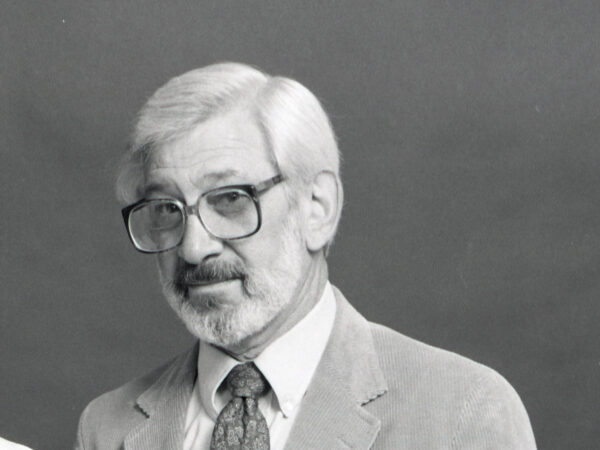
Henry J. Tobias. Photo courtesy Western History Collections, University of Oklahoma Libraries, OUEMP 86348
Henry J. Tobias died March 28, 2021, just after his 96th birthday. He was born in Paterson, New Jersey, to eastern European immigrants, who left the Russian Empire in the wake of the failed Bundist revolt of 1905. Tobias said that his parents spoke Yiddish and English with his brother and him but lapsed into Polish when they did not want children to understand. Naturally, Tobias went on to study Russian.
His first love was music. He played drums with the guitarist John Paul “Bucky” Pizzarelli in the Catskills while still a teenager. In 1943, at age 18, he entered the army; his German- and French-language skills got him attached to a general as a translator. He came ashore on the third day at Normandy. Because he was a nonsmoker, his daily ration of American cigarettes made him very well off in France, where cigarettes served as a currency. He found a Jewish cousin who had survived the war in Paris, and she showed him the sights. He recalled that there was no feeling like being part of an army of welcomed liberators, as he was in France.
On his return, the GI Bill allowed him to complete a history BA at Ohio State University. He then moved to Yale University, where he earned his MA under the Russian historian George Vernadsky. He completed his PhD at Stanford under Anatole Mazour. His first book, The Jewish Bund in Russia: From Its Origins to 1905 (Stanford Univ. Press, 1972), delved into the experiences of Bundists, members of a Jewish socialist revolutionary group who, like his parents, had been disappointed by the failure of that revolutionary moment.
He taught at Elmira College, the University of New Mexico, Kansas State University, and, from 1969 until 1988, the University of Oklahoma, Norman. There he served as chair of the Department of History and as director of the Western History Collections. He began writing about American Jewish history at the request of his colleague, H. Wayne Morgan, editor of the Newcomers to a New Land series from the University of Oklahoma Press; the result was The Jews in Oklahoma (1980).
Tobias was an affable, encouraging colleague and mentor and a memorable teacher to his many students. He was unfailingly kind and always asked the most probing questions. At the University of Oklahoma, he confessed that once he tried to teach Russian history backward, beginning with the Cold War and stretching back to the Kievan Rus’. He said it was intellectually satisfying, but the students had trouble following, so he did not attempt it again. Retiring in 1988 just before the collapse of the Soviet Union seemed to him in retrospect sensible, since the problems Russia would face differed from what they were in the Soviet era.
After retirement, he moved back to Albuquerque and continued his research into Jewish and local history, publishing A History of the Jews in New Mexico (Univ. of New Mexico Press, 1990). He also began working on projects with the sociologist Charles Woodhouse, co-authoring Santa Fe: A Modern History, 1880–1990 (Univ. of New Mexico Press, 2001) and Jews in New Mexico since World War II (Univ. of New Mexico Press, 2008). He was in demand as a lecturer for Jewish groups interested in communities’ pasts. He noted that American history was so much easier to research than Russian history because of the ease of access to materials, particularly the US Census.
Married and divorced twice, he is survived by three daughters, who remember that he entertained them with his love of music and literature and with very silly jokes.
Daniel C. Snell
University of Oklahoma, Norman
This work is licensed under a Creative Commons Attribution-NonCommercial-NoDerivatives 4.0 International License. Attribution must provide author name, article title, Perspectives on History, date of publication, and a link to this page. This license applies only to the article, not to text or images used here by permission.